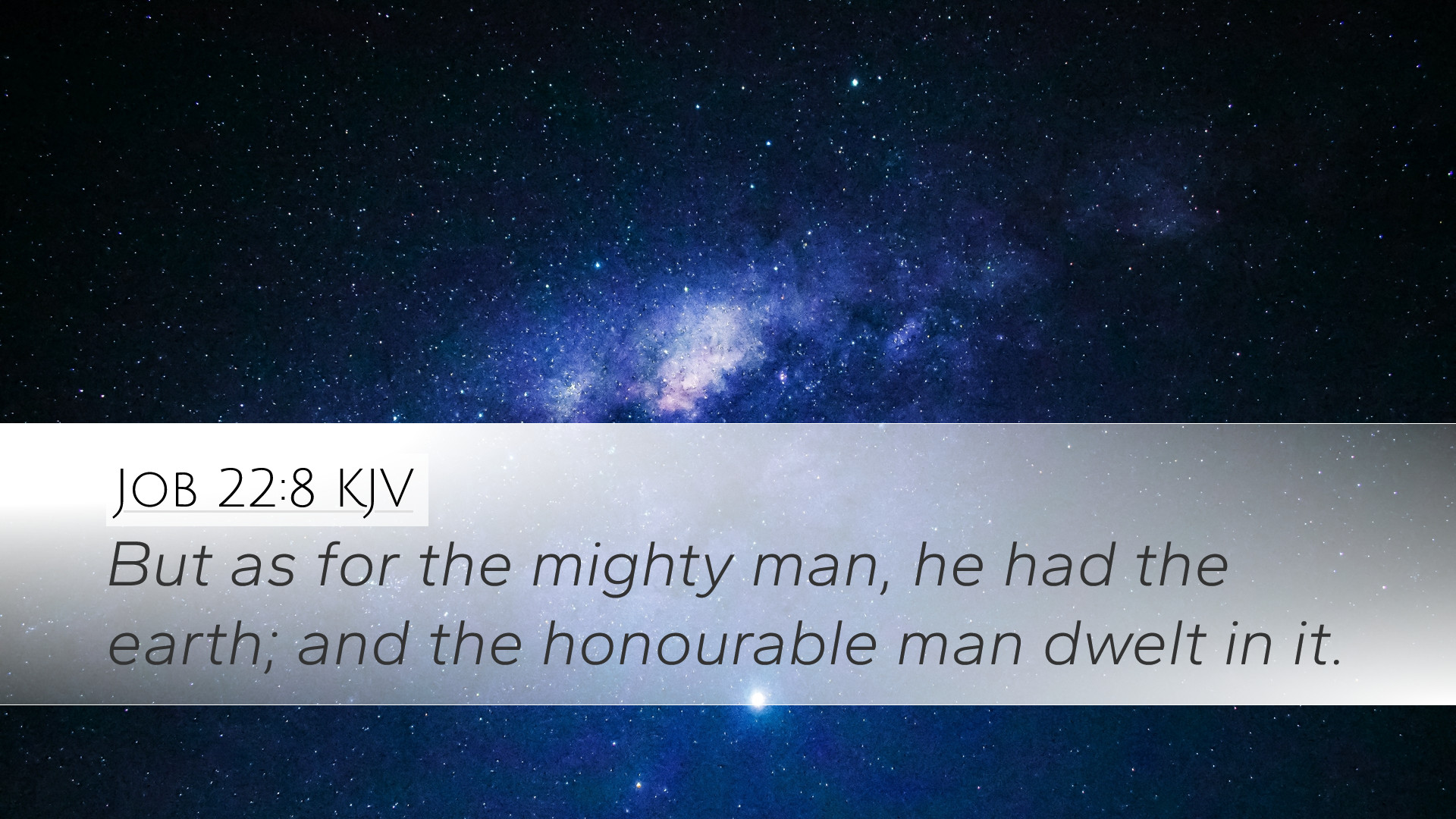Old Testament
Genesis Exodus Leviticus Numbers Deuteronomy Joshua Judges Ruth 1 Samuel 2 Samuel 1 Kings 2 Kings 1 Chronicles 2 Chronicles Ezra Nehemiah Esther Job Psalms Proverbs Ecclesiastes Song of Solomon Isaiah Jeremiah Lamentations Ezekiel Daniel Hosea Joel Amos Obadiah Jonah Micah Nahum Habakkuk Zephaniah Haggai Zechariah MalachiJob 22:8
Job 22:8 KJV
But as for the mighty man, he had the earth; and the honourable man dwelt in it.
Job 22:8 Bible Commentary
Commentary on Job 22:8
Verse: Job 22:8 - "But as for the rich, he hath taken it out of his hand."
Overview
This verse is part of a larger discourse where Eliphaz the Temanite responds to Job's complaints about his sufferings. The context reveals his views on the justness of God and the underlying moral framework he believes governs divine retribution.
Commentary Insights
1. Eliphaz's Perspective
Matthew Henry offers insights into Eliphaz's character, noting that he often represents a view that equates prosperity with righteousness and suffering with vice. In Job 22:8, Eliphaz accuses Job of having gained wealth through wrongful means, suggesting that God has stripped him of it as a punishment.
Albert Barnes expands on this, suggesting that Eliphaz’s statement reflects a common belief in retributive justice—wherein the wealthy are perceived as having received their rewards through divine favor. This raises questions concerning the nature of suffering, wealth, and theocratic justice.
2. Theological Implications
Adam Clarke emphasizes the theological implications of understanding wealth as a sign of divine approval. Clarke warns that such an interpretation can lead to a dangerous theology of prosperity that is devoid of deeper truths about God's character and His sovereignty over adversity.
This verse serves as a pivotal moment in the dialogue, reflecting the fundamental misunderstanding that Eliphaz has regarding Job's character. Clarke’s analysis highlights that Job’s afflictions challenge the simplistic ideas of divine justice, prompting a deeper exploration of suffering in the life of the righteous.
3. The Nature of Wealth and Divine Providence
Both Henry and Barnes note the significance of wealth in this context. Wealth, in biblical terms, can signify security and blessing yet also comes with moral responsibilities. The notion that the rich are immune from suffering is criticized; rather, Job's experience shows that affliction can beset anyone, regardless of their worldly status.
- Responsibility of Wealth: Wealth is not simply a measure of God’s favor but the test of stewardship and moral integrity.
- Sovereignty of God: God’s control over all circumstances challenges the simplistic correlation between wealth and righteousness.
4. Practical Applications for Today
The commentary on Job 22:8 has practical implications for pastors, students, and scholars today:
- Understand Suffering: Embrace a theology that allows for suffering in the life of the believer without attributing it directly to sin or moral failure.
- Discernment in Teaching: Educators and church leaders must approach the topic of wealth and poverty with sensitivity, avoiding the pitfalls of prosperity theology.
- Encouragement for the Afflicted: Use Job's story to counsel those experiencing hardships, reinforcing hope and the goodness of God amidst trials.
Conclusion
Job 22:8 embodies a critical theological moment in the discussion of divine justice and human suffering. The insights garnered from traditional commentaries underscore the dangers of misinterpreting God’s governance and the consequences of viewing material wealth as a direct measure of God’s blessings. As we reflect on Eliphaz’s words, the broader narrative of Job calls for a deeper understanding of God’s ways, urging us to embrace faith in the face of incomprehensible trials.


